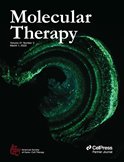The Vector
Editorial Team
Karen Bulaklak, PhD – Editor, The Vector
Jon Brudvig, PhD – Associate Editor, The Vector
Jessica Schneller, PhD – Junior Editor, The Vector
Inside This Issue
Leadership Message
Breaking Through
From Molecular Therapy
Society News
Career Center
Public Policy
Industry News
Leadership Message
Final Days to Renew Your Membership

Hello ASGCT members,
We’re in the final stretch of membership renewal! The deadline to renew your ASGCT membership for 2023 is next Wednesday, March 15. If you haven’t already, please renew today to make sure you keep your benefits through the rest of this year. Benefits include registration discounts for the Annual Meeting, on-demand access to ASGCT events, a subscription to the field-leading Molecular Therapy, and many more. Your membership is critical to our Society as we continue to grow and create more programs and opportunities; renew now so we can further the field together.
Speaking of exclusive member opportunities, March 15 is also the deadline to apply for our inaugural Congressional Policy Fellowship. If you’re interested in impacting federal science policy, apply for this paid, year-long fellowship in Washington, D.C. we’re offering with the American Association for the Advancement of Science (AAAS). Mentors from both organizations will guide you as you work with legislators on Capitol Hill to develop policy and further ASGCT’s mission. Apply by March 15!
Finally, we hope you’re getting as excited as we are for the 26th Annual Meeting, which will be bigger and better than ever. We’re accepting late-breaking abstracts through March 17 if you’re working on research that is high impact, groundbreaking, innovative and newsworthy. Learn more here and submit your abstract for the chance to present your work during the meeting. Make sure you’re registered as soon as possible, too, because hotels are filling up quickly! We’ve been updating the program every week if you’d like to start planning your schedule—I know I will! Don’t forget to add on one of our opening day workshops to your meeting registration. Whether you’re a first-time meeting attendee, making the switch from academia to industry, or learning how to become a site for AAV gene therapy trials, we have a workshop for you!
I’m looking forward to seeing you soon, in person and virtually.
Sincerely,
Hans-Peter Kiem, MD, PhD
ASGCT President
Breaking Through
Induction of antigen-specific tolerance by hepatic AAV immunotherapy regardless of T cell epitope usage or mouse strain background
Authors: Keeler GD, Gaddie CD, Sagadevan AS, Senior KG, Côté I, Rechdan M, Min D, Mahan D, Poma B, Hoffman BE
DOI: https://doi.org/10.1016/j.omtm.2022.12.011
Summary by Jon Brudvig, PhD
Gene replacement has long been the mainstay of AAV gene therapy, but AAV can accomplish much more than replace lost gene function. More recent applications have effectively utilized AAV to edit genes, to alter gene expression levels, and to deliver genes encoding everything from disease-modifying proteins to antibodies to modulators of neuronal function. And this repertoire of applications only continues to expand. In a new study in Molecular Therapy—Methods & Clinical Development, Geoffrey D. Keeler and associates demonstrate the power of AAV for another “expansion” application, induction of antigen-specific immune tolerance to combat autoimmune disease. Building upon prior studies exploring such a strategy for multiple sclerosis (MS), the authors present an impressively efficacious proof-of-concept for an AAV-mediated immunomodulatory therapy.
MS is a complex disorder wherein immune cells cross the blood-brain barrier and invade the central nervous system (CNS) parenchyma causing local inflammation, demyelination, and neurodegeneration. While the precise etiology of multiple sclerosis is unknown, autoimmunity is known to play an important role. In a healthy scenario, regulatory T cells (Tregs) maintain tight control of self-tolerance, preventing immune responses against circulating CNS proteins such as the myelin oligodendrocyte glycoprotein (MOG), myelin basic protein (MBP), and proteolipid protein (PLP). In MS, tolerance to one or more of these proteins is lost, and the immune system mounts a strong inflammatory response against white matter in the brain and spinal cord.
In the present article, Keeler and associates present a highly effective strategy for restoring this tolerance, leading to a potent reduction in symptoms in a mouse model of MS. It has long been known that expression of various antigens by liver hepatocytes can result in systemic immune tolerance through a complex adaptive response involving Tregs. In this study, mice were treated with an AAV vector driving expression of full-length MOG in hepatocytes in an effort to induce persistent tolerance to MOG antigens. When mice were later treated with a protocol to induce MS-like pathology and symptoms (Experimental Autoimmune Encephalitis, or EAE), the AAV-treated mice were entirely resistant to the disease. Perhaps more importantly, when EAE was induced first, the AAV treatment rapidly reversed progression, presumably through a restoration of immune tolerance.
The vector used here induced tolerance using full-length MOG rather than specific immunogenic fragments (as in prior studies), leading to protection from autoimmune reactions against multiple MOG epitopes. This strategy was effective in a several mouse strains with distinct MHC haplotypes, reinforcing the potential for utility in a genetically diverse human population. Nevertheless, much more work will be required to translate these results to the clinic. EAE is a highly simplified model of MS that recapitulates neither the multifaceted MS etiology nor the diversity of epitopes driving autoimmunity. Still, this work is a powerful illustration of the potential broad utility of AAV for the treatment of autoimmune disease, and could bring the field one step closer to a durable, specific therapy for MS.
From Molecular Therapy
 Special issue call for papers: Biomanufacturing in gene and cell therapy
Special issue call for papers: Biomanufacturing in gene and cell therapy
Submit to a special issue of Molecular Therapy—Methods and Clinical Development by May 31! The issue will be dedicated to all aspects of preclinical and clinical manufacturing of gene and cell therapy products. Learn more and submit today!
Latest MT issues: Check out the most recent issues of these Molecular Therapy family journals:
Society News
March 15: Last Chance to Renew Your Membership
Remember to renew your ASGCT membership to maintain access to exclusive member benefits before the March 15 drop date. Members have access to registration discounts for the Annual Meeting and other events, access to on-demand sessions, a subscription and publication discounts for Molecular Therapy, and more; make sure you don't lose these benefits by renewing today.
Submit a Late-breaking Abstract to Present at the Annual Meeting
We want to see your late-breaking work! If you have research that is high impact, innovative, groundbreaking, and newsworthy, send it to us by March 17 for the opportunity to share it at the 26th Annual Meeting. Associate members: If you're a first and presenting author of an accepted late-breaking abstract, you can register for the meeting for free.
Hear Drew Weissman, MD, PhD, on Our Latest Podcast Episode
Check out the most recent episode of ASGCT's podcast, Giants of Gene Therapy, to hear from Drew Weissman, MD, PhD! Dr. Weissman talks about the ups and downs of pioneering mRNA vaccines for COVID-19, as well as other vaccines he's working on. Subscribe on our website to listen, and tune in to hear Annual Meeting keynote speaker Jennifer Doudna, PhD, on the next episode.
Career Center
Are you looking for a job in the field of gene and cell therapy? Check out the new ASGCT Career Center for great opportunities with industry, government, and academic organizations. Sign up to receive alerts for open jobs in your area.
If you're from a recruiting institution, advertise in the Featured Jobs section to target the 5,000+ audience of The Vector.
.png)
Featured Jobs
Public Policy
HHS Announces Three New Payment Models for CGT
In response to President Biden's Executive Order on lowering prescription drug costs, the Department of Health and Human Services (HHS) announced three new payment models to be tested by the Centers for Medicare and Medicaid Innovation (CMMI). CMMI, a part of CMS, was created to support the development of "various payment and service delivery models that aim to achieve better care for patients, better health for our communities, and lower costs through improvement for our health care system."
The Cell and Gene Therapy Access Model will require CMS to explore ways to coordinate and administer multi-state, outcomes-based arrangements with manufacturers for selected cell and gene therapies. Also, of interest to the field, the Accelerating Clinical Evidence Model would consider the impact of differential payment rates for accelerated approval drugs on the completion of post-market confirmatory trials. The third model selected, the Medicare $2 Drug List, would select high-value generic drugs to be capped at a max co-payment of $2 for a month's supply for Part D plans.
The HHS report also directed CMMI to evaluate other potential models. Most relevant to the field, CMMI is directed to investigate site neutral bundled payment options for CGT in Medicare fee-for-service for extended care episodes. The additional research section also discussed biosimilar adoption and price transparency.
This blog post shares more information on each new proposed model and how they might impact the cell and gene therapy field. The Society's staff will monitor these models and share information as it becomes available.
View the Regulatory and Legislative Programming at the 26th Annual Meeting
ASGCT has a full slate of scientific and policy-focused symposia available to attendees of the hybrid meeting May 16-20. View the complete list of symposia and workshops and register to attend here.
Join a special town hall-style symposium to hear regulators from FDA and the Japanese Pharmaceuticals and Medical Devices Agency (PMDA) discuss the current outlook for clinical development in 2023 and beyond. Peter Marks, MD, PhD, director of FDA CBER, and Yoshiaki Maruyama, PhD, review director of cellular and tissue-based products at PMDA, will address upcoming guidance documents, new policies, and convergence efforts between regulatory bodies. Additionally, ASGCT's Accelerated Approvals for Cell and Gene Therapies symposium is tailored to researchers seeking additional information regarding the scientific underpinnings of the accelerated approval pathway and its relevance to CGT.
There will be an interactive workshop on CMC Development Challenges and How to Avoid Them as well as a symposium Comparability Challenges for CMC. These sessions, paired on the same meeting day for attendee convenience, will present attendees with information they can use to make timely, informed decisions throughout the development cycle. The workshop will begin with presentations from FDA and industry experts, then present hypothetical scenarios for attendees to consider possible courses of action based on what they learned.
In the Medicaid Coverage and Reimbursement of Cell and Gene Therapies symposium, speakers will discuss current barriers to patient access under the Medicaid system and propose solutions so that the existing system may better accommodate the pipeline of advanced therapies. Shifting the perspective to patient access, the Pricing Considerations in Genetic Therapies: Reassessing Access and Privilege session will engage a series of stakeholders to provide their views on the U.S. health care system at large, unique development and pricing considerations for CGTs, and the question of privilege in patient access.
Be sure to check back as more speakers are confirmed, and register as a virtual or in-person attendee today.
Apply for Congressional Policy Fellowship Through March 15
Applications for the Congressional Policy Fellowship are due March 15!
Who? ASGCT members with a post-doctoral degree and U.S. citizenship.
Where? Washington, D.C. ASGCT will provide a moving stipend to assist with relocation costs if fellows need to relocate from more than 50 miles away.
When? Beginning this fall, the Fellowship will run for one year. Submit applications by March 15.
Why? You'll make an impact on federal policy while gaining access to leading support and networking resources. At the end of the fellowship, you'll be equipped to forge a new career in policymaking circles or return to your institution with a unique and valuable skillset.
How? Submit applications to fellowship@asgct.org. A summary of application materials and FAQ are available, so take a look and apply today!
Industry News
Interested in advertising in The Vector?
View the Rate Sheet